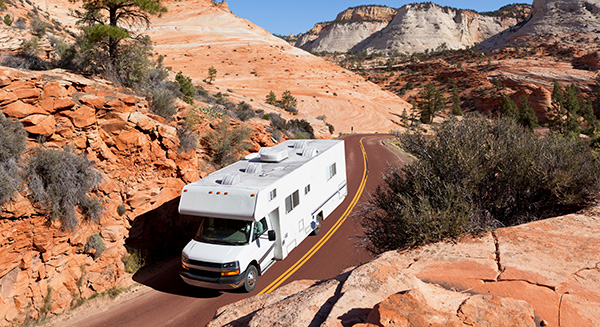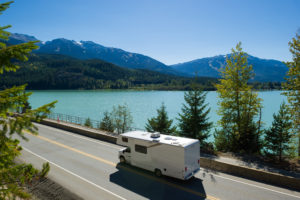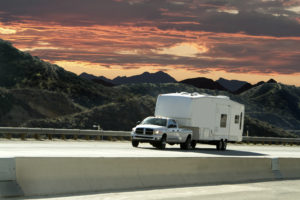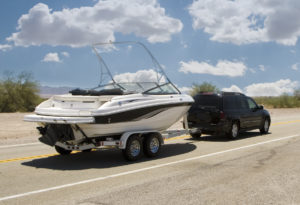12 Ways To Improve RV Fuel Efficiency For The Best MPG

Before you bought your RV, you probably knew that it would be more of a gas guzzler than a normal car, SUV or pickup truck. Hopefully, you considered rising gas prices in your budget when purchasing your RV, too. You most likely considered RV fuel efficiency, miles per gallon, and many other factors before making the investment. Maybe the best trailer, camper or van for you checked all your boxes except the one regarding gas mileage. Luckily, there are some ways you can improve fuel efficiency for any RV.
Below are some affordable ways you can improve your RV’s fuel efficiency and gas mileage. Of course, not every suggestion will work for you and your lifestyle. But even making a couple changes here and there can save you money and achieve better mpg.
12 Tips For Better RV Fuel Efficiency
1. Slow Down
Yes, simply slowing down while going from point A to point B can improve your RV fuel efficiency. For every mile that you go over 60 mph, you are tacking on at least 10 more cents per gallon. Say you’re going 75 mph. That extra 15 mph will cost you about $1.50 more on gas. That adds up quickly, especially when RVing long distances.
2. Change Your Air Filter
You can actually improve your gas mileage by up to 10% if you keep your RV air filters clean. This is a very simple and affordable thing to do that most RVers are not consistent about.
3. Check Your Tire Pressure
 It’s extremely important to keep your RV’s tires properly inflated, specifically for safety reasons, but also because it improves RV fuel efficiency. Make sure to inflate the tires according to your owner’s manual instructions. This will help your tires last longer while also saving you money on gas. It will also decrease the risk of a blowout, which can be very dangerous. Don’t just go by sight when inflating your tires. Use a reliable air pressure gauge instead. Always check your tire pressure regularly during a long trip and be sure to do it when the tires are cold.
It’s extremely important to keep your RV’s tires properly inflated, specifically for safety reasons, but also because it improves RV fuel efficiency. Make sure to inflate the tires according to your owner’s manual instructions. This will help your tires last longer while also saving you money on gas. It will also decrease the risk of a blowout, which can be very dangerous. Don’t just go by sight when inflating your tires. Use a reliable air pressure gauge instead. Always check your tire pressure regularly during a long trip and be sure to do it when the tires are cold.
4. Don’t Idle
Leaving your RV running while you’re waiting for something or someone is a great way to waste the expensive fuel you just put in your tank. Instead, turn your RV off whenever you’ll be idling for longer than 5 minutes.
5. Use Overdrive
It’s true, turning overdrive on in your motorhome will improve your RV fuel efficiency. When you turn overdrive on, your RV’s transmission will automatically switch to the larger gear when it can. Switching to the larger gear means that the engine can uses fewer RPMs to keep your motorhome moving down the road. Fewer RPMs means you’re using less fuel, too.
6. Use Cruise Control
Activating cruise control on your RV also saves gas. This is because driving at a constant speed is less work for the engine. However, if you’re driving over 60 mph, you’re still spending more money on gas.
7. Make Sure Your RV Is In Good Shape
RV maintenance is an important part of RV life and there’s really no way to get around it. Not keeping your motorhome in tip-top shape can cause mechanical problems which will slow down your RV and cause it to use more gas than necessary. You can be using up to 40% more fuel if you have mechanical problems you may not even be aware of.
8. Use the Recommended Oil
Some people try to save money by using the improper oil for their vehicle. However, if you’re filling your RV up with a cheaper, lower grade oil than it requires, you’ll probably end up spending more money on gas. Synthetic oil generally costs more but can increase RV fuel efficiency.
9. Use the Recommended Gas
 The same concept applies when it comes to gas. Refer to the manual to see what type of gas your RV requires. If your motorhome is not specified to take a higher-octane gas, don’t waste your money. However, if it does require it, don’t skimp because doing so will only cause more expensive problems later down the line.
The same concept applies when it comes to gas. Refer to the manual to see what type of gas your RV requires. If your motorhome is not specified to take a higher-octane gas, don’t waste your money. However, if it does require it, don’t skimp because doing so will only cause more expensive problems later down the line.
10. Keep Your Load Light
One reason some RVs use more gas than others is because they’re carrying a lot of weight. The lighter you keep your load, the less gas your RV will require. Downsizing even more may not always be practical for full-time RVers. If that’s the case, try to utilize some of the tips above for better RV fuel efficiency instead.
11. Use Your Air Conditioner Less
This may be more difficult to do during the summer months, but air conditioners can be real gas guzzlers. You may want to plan your trips around destinations that will be cooler in the summer so that you can use your air conditioner less. If not, the best thing you can do is park in the shade.
12. Trade It In
This is typically the least affordable option, but some RVers choose to downsize their gas-guzzling motorhomes for smaller travel trailers or campers. This is something you should think long and hard about before making a decision. You need to prioritize your need for space versus fuel efficiency. You want your road trips to be enjoyable, not cramped.
RV Insurance
 No matter what type of RV you have, you need Specialty RV Insurance. An Auto Insurance policy will not provide sufficient coverage in the event of an accident or mishap. It’s essential to have the right coverage, but it doesn’t have to be expensive. For a free quote and low rates, call an Insurance Specialist at (866) 501-7335.
No matter what type of RV you have, you need Specialty RV Insurance. An Auto Insurance policy will not provide sufficient coverage in the event of an accident or mishap. It’s essential to have the right coverage, but it doesn’t have to be expensive. For a free quote and low rates, call an Insurance Specialist at (866) 501-7335.
The information in this article is obtained from various sources. This content is offered for educational purposes only and does not represent contractual agreements. It should not replace manuals or instructions provided by the manufacturer or the advice of a qualified professional. The definitions, terms, and coverage in a given policy may be different than those suggested here. No warranty or appropriateness for a specific purpose is expressed or implied.
